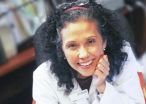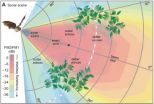(Press-News.org) West Orange, NJ. August 15, 2014. Kessler stroke researchers and colleagues have identified an association between over-optimistic estimation of one's own ability to take medications accurately, and memory loss among stroke survivors. Results indicate that assessing patients for their ability to estimate medication skills accurately may predict memory disorder. The article, "Stroke survivors over-estimate their medication self-administration ability (MSA), predicting memory loss," was epublished ahead of print on May 28 by Brain Injury (doi:10.3109/02699052.2014.915984). The authors are AM Barrett, MD, and J Masmela of Kessler Foundation, Elizabeth E Galletta of Hunter College, Jun Zhang of St. Charles Hospital, Port Jefferson, NY, and Uri Adler, MD, of Kessler Institute for Rehabilitation.
Researchers compared 24 stroke survivors with 17 controls, using the Hopkins Medication Schedule to assess MSA, the Geriatric Depression Scale to assess mood, and the Hopkins Verbal Test and Mini-Mental State Examination to assess memory. Results showed that stroke survivors over-estimated their MSA in comparison to controls. Over-estimation of MSA correlated strongly with verbal memory deficit.
Strategies that enhance adherence to medication are a public health priority. "Few studies, however, have looked at cognitive factors that may interfere with MSA," commented Dr. Barrett. "While some stroke survivors have obvious cognitive deficits, many people are not aware that stroke survivors can be intelligent and high functioning, but still have trouble with thinking that can cause errors in medication self-management. These individuals may not realize their own deficits, a condition called cognitive anosognosia. Screening stroke survivors for MSA may be a useful approach to identifying memory deficits that hinder rehabilitation and community participation and contribute to poor outcomes."
Larger studies of left and right stroke survivors need to be conducted in the community and rehabilitation settings in order to determine the underlying mechanisms for both over-estimation and under-estimation of self-performance.
INFORMATION:
Funded by National Institutes of Health (Barrett, PI: K24HD062647), and Kessler Foundation.
About Stroke Rehabilitation Research at Kessler Foundation
Research studies span all domains of post-stroke cognitive dysfunction, but emphasize hidden disabilities after stroke, including hidden disabilities of functional vision (spatial bias and spatial neglect). Students, resident physicians, and post-doctoral trainees are mentored in translational neuroscience of rehabilitation. Dr. Barrett and her colleagues work closely with the clinical staff at Kessler Institute for Rehabilitation. Among their collaborative efforts are the founding of the Network for Spatial Neglect and development of the Kessler Foundation Neglect Assessment Process (KF-NAPTM). Stroke Research receives funding from NIDRR; the National Institutes of Health/NICHD/NCMRR; Kessler Foundation; the Healthcare Foundation of New Jersey; and the Wallerstein Foundation for Geriatric Improvement. Scientists have faculty appointments at Rutgers New Jersey Medical School.
About AM Barrett, MD
AM Barrett, MD, a cognitive neurologist and clinical researcher, studies brain-behavior relationships from the perspectives of cognitive neurology, cognitive neuroscience, and cognitive neurorehabilitation. Dr. Barrett is an expert in hidden cognitive disabilities after stroke, which contribute to safety problems & rehospitalization, increased caregiver burden, & poor hospital-to-home transition. She is director of Stroke Rehabilitation Research at Kessler Foundation and chief of Neurorehabilitation Program Innovation at Kessler Institute for Rehabilitation. She is a founder of the Network for Spatial Neglect, which promotes multidisciplinary research for this underdiagnosed hidden disability. Dr. Barrett is also professor of physical medicine & rehabilitation at Rutgers New Jersey Medical School and adjunct professor of neurology at Columbia University School of Medicine. She is a former president of the American Society for Neurorehabilitation.
Dr. Barrett is author of the reference article Spatial Neglect on emedicine.com.
About Kessler Foundation
Kessler Foundation, a major nonprofit organization in the field of disability, is a global leader in rehabilitation research that seeks to improve cognition, mobility and long-term outcomes, including employment, for people with neurological disabilities caused by diseases and injuries of the brain and spinal cord. Kessler Foundation leads the nation in funding innovative programs that expand opportunities for employment for people with disabilities. For more information, visit KesslerFoundation.org; Tweet us @KesslerFdn
About Kessler Institute for Rehabilitation
Kessler Institute for Rehabilitation is nationally recognized for the treatment and research of both spinal cord and brain injuries and leads the field in the care and treatment for stroke, neurological diseases, amputation, orthopedic and musculoskeletal conditions and cardiac recovery. Ranked as one of the top two rehabilitation hospitals in the nation and best in the greater New York/New Jersey metropolitan area by U.S. News & World Report, Kessler has three hospital campuses in West Orange, Saddle Brook and Chester, N.J., and more than 85 outpatient centers throughout the state. For more information, visit http://www.kessler-rehab.com/.
Contacts
Carolann Murphy
973-324-8382
CMurphy@KesslerFoundation.org
Lauren Scrivo
Phone: 973-324-8384
Cell: 973-768-6583
Email: LScrivo@KesslerFoundation.org
Stroke researchers link ability to self-administer medication with memory loss
Screening stroke survivors for medication self-administration ability may be a useful approach to identifying memory deficits that contribute to poor outcomes
2014-08-15
ELSE PRESS RELEASES FROM THIS DATE:
Visual exposure predicts infants' ability to follow another's gaze
2014-08-15
Following another person's gaze can reveal a wealth of information critical to social interactions and also to safety. Gaze following typically emerges in infancy, and new research looking at preterm infants suggests that it's visual experience, not maturational age, that underlies this critical ability.
The research is published in Psychological Science, a journal of the Association for Psychological Science.
"To the best of our knowledge, this is the first study showing that some aspects of the early development of social cognition is influenced by experience, even ...
NASA satellite spots a weakening Karina, now a tropical storm
2014-08-15
NASA's Terra satellite passed over Hurricane Karina before it weakened to a tropical storm early on August 15 and imagery showed the vertical wind shear was already taking its toll.
NASA's Terra satellite passed over Karina on August 14 at 2:40 p.m. EDT when it was still clinging to hurricane status and noticed that wind shear was already having an effect on the storm's structure. The Moderate Resolution Imaging Spectroradiometer or MODIS instrument captured an image that showed that the bulk of Karina's clouds were being pushed to the western side of the storm. That ...
NASA sees no punch left in Tropical Storm Julio
2014-08-15
Tropical Storm Julio doesn't have any strong thunderstorms or strong convection left in it according to infrared satellite imagery from NASA.
When NASA's Aqua satellite passed over Tropical Storm Julio on August 14 at 12:23 UTC (8:23 a.m. EDT), the Atmospheric Infrared Sounder known as AIRS analyzed the clouds and temperatures of the storm. The AIRS data showed that cloud tops had warmed and dropped lower in the atmosphere. That indicates that the strength behind rising air had weakened and was not forming strong, high thunderstorms with cold cloud tops.
There was a ...
Bigger government makes for more satisfied people, international Baylor study finds
2014-08-15
People living in countries with governments that spend more on social services report being more contented, according to a Baylor University study.
"The effect of state intervention into the economy equals or exceeds marriage or employment status — two traditional predictors of happiness — when it comes to satisfaction," said Patrick Flavin, Ph.D., assistant professor of political science in Baylor's College of Arts & Sciences.
The study — "Assessing the Impact of the Size and Scope of Government on Human Well-Being" — is published in the journal Social Forces. The researchers ...
Dynamic culture of a thermosensitive collagen hydrogel improves tissue-engineered peripheral nerve
2014-08-15
Tissue engineering technologies offer new treatment strategies for the repair of peripheral nerve injury, but cell loss between seeding and adhesion to the scaffold remains inevitable. In a study reported on the Neural Regeneration Research (Vol. 9, No. 14, 2014), a thermosensitive collagen hydrogel remained as a liquid when kept at temperatures below 10°C and gelled when the temperature was increased to 37°C in an incubator for 30 minutes, which was used as an extracellular matrix and combined with bone marrow mesenchymal stem cells to construct tissue-engineered peripheral ...
Incentives, innovation and growth
2014-08-15
Over the past decades, the economic sciences have seen fundamental breakthroughs in our understanding of human responses to incentives in the face of uncertainty and strategic interactions. But what is the scope and what are the limits for applying these models in the design of better institutions and better policies? And to what extent can they teach us what is needed to encourage the innovation that drives economic growth and social wellbeing? These are among the questions to be debated among 17 Nobel Laureates in Economic Sciences and approximately 450 aspiring young ...
New ways to treat solid tumors
2014-08-15
An international team of scientists has shown that an antibody against the protein EphA3, found in the micro-environment of solid cancers, has anti-tumour effects.
As EphA3 is present in normal organs only during embryonic development but is expressed in blood cancers and in solid tumours, this antibody-based approach may be a suitable candidate treatment for solid tumours.
The researchers from Monash University and Ludwig Cancer Research, in Australia, and KaloBios Pharmaceuticals, in the US, have had their findings published in the journal Cancer Research.
The ...
Guidelines can predict early menopause in child cancer survivors
2014-08-15
Girls with cancer who are most likely to become infertile after treatment can be identified using guidelines developed almost 20 years ago, new research shows.
The criteria – developed in Edinburgh – will help to select which girls should be offered the opportunity to freeze some tissue from their ovaries for use in the future.
Doctors are optimistic that the frozen tissue could one day help young cancer survivors to have children of their own.
Some cancer treatments can affect female fertility by bringing on early menopause. Freezing samples of ovary tissue before ...
Bats bolster brain hypothesis, maybe technology, too
2014-08-15
PROVIDENCE, R.I. [Brown University] — Amid a neuroscience debate about how people and animals focus on distinct objects within cluttered scenes, some of the newest and best evidence comes from the way bats "see" with their ears, according to a new paper in the Journal of Experimental Biology. In fact, the perception process in question could improve sonar and radar technology.
Bats demonstrate remarkable skill in tracking targets such as bugs through the trees in the dark of night. Brown University neuroscience Professor James Simmons, the review paper's author, has long ...
A study of possible extended symmetries of field theoretic systems
2014-08-15
There has been much recent interest, especially among cosmologists, in theories known as galileons. Galileons are an interesting and novel, though still hypothetical, class of effective scalar fields which are extremely universal and have attracted much recent attention. They arise generically in describing the short distance behavior of the new degrees of freedom introduced during the process of modifying gravity, and in describing the dynamics of extra dimensional brane worlds. Modified gravity and brane worlds are just some of the ideas that have been studied as possible ...
LAST 30 PRESS RELEASES:
New knowledge on heritability paves the way for better treatment of people with chronic inflammatory bowel disease
Under the Lens: Microbiologists Nicola Holden and Gil Domingue weigh in on the raw milk debate
Science reveals why you can’t resist a snack – even when you’re full
Kidney cancer study finds belzutifan plus pembrolizumab post-surgery helps patients at high risk for relapse stay cancer-free longer
Alkali cation effects in electrochemical carbon dioxide reduction
Test platforms for charging wireless cars now fit on a bench
$3 million NIH grant funds national study of Medicare Advantage’s benefit expansion into social supports
Amplified Sciences achieves CAP accreditation for cutting-edge diagnostic lab
Fred Hutch announces 12 recipients of the annual Harold M. Weintraub Graduate Student Award
Native forest litter helps rebuild soil life in post-mining landscapes
Mountain soils in arid regions may emit more greenhouse gas as climate shifts, new study finds
Pairing biochar with other soil amendments could unlock stronger gains in soil health
Why do we get a skip in our step when we’re happy? Thank dopamine
UC Irvine scientists uncover cellular mechanism behind muscle repair
Platform to map living brain noninvasively takes next big step
Stress-testing the Cascadia Subduction Zone reveals variability that could impact how earthquakes spread
We may be underestimating the true carbon cost of northern wildfires
Blood test predicts which bladder cancer patients may safely skip surgery
Kennesaw State's Vijay Anand honored as National Academy of Inventors Senior Member
Recovery from whaling reveals the role of age in Humpback reproduction
Can the canny tick help prevent disease like MS and cancer?
Newcomer children show lower rates of emergency department use for non‑urgent conditions, study finds
Cognitive and neuropsychiatric function in former American football players
From trash to climate tech: rubber gloves find new life as carbon capturers materials
A step towards needed treatments for hantaviruses in new molecular map
Boys are more motivated, while girls are more compassionate?
Study identifies opposing roles for IL6 and IL6R in long-term mortality
AI accurately spots medical disorder from privacy-conscious hand images
Transient Pauli blocking for broadband ultrafast optical switching
Political polarization can spur CO2 emissions, stymie climate action
[Press-News.org] Stroke researchers link ability to self-administer medication with memory lossScreening stroke survivors for medication self-administration ability may be a useful approach to identifying memory deficits that contribute to poor outcomes




